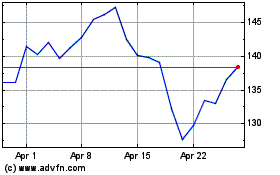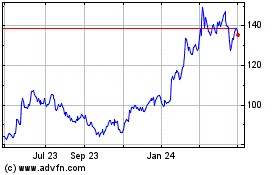What a Small Chip Fab Really Buys
May 15 2020 - 2:46PM
Dow Jones News
By Dan Gallagher
Anyone in the business of making chips knows that little things
can make a big difference.
Taiwan Semiconductor Manufacturing, better known as TSMC,
currently makes chips with circuitry measuring 5 nanometers thick.
That is about twice the diameter of a strand of human DNA, and is
the most advanced chipmaking process in production today. It will
be put to use in the new fabrication plant the company is now
planning to build in Arizona, with the explicit blessing of the
U.S. government.
But despite the impressive-sounding specs, the project TSMC
announced Friday morning will actually be rather limited in scale
and impact. The company says it will spend a total of $12 billion
on the project over an eight-year period starting next year; TSMC's
capital expenditures this year alone are expected to top $15
billion. And by the time the plant is fully up and running in 2024,
5 nanometers won't even count as top of the line anymore. TSMC
disclosed on its earnings call last month that its 3-nanometer
process is expected to be in volume production by the second half
of 2022.
Nor will the project do much for the U.S. government's widely
touted efforts to bring more of the high-tech supply chain onshore.
TSMC says the Arizona facility will produce about 20,000 silicon
wafers a month. That is just one-fifth the size of its largest fabs
currently running in Taiwan and wouldn't even be close to meeting
the needs of the company's largest U.S. customers. Mark Li of
Bernstein estimates that Apple alone requires 60,000 to 100,000
wafers a month. He also says that TSMC's history with other fabs
built outside of its home base in Taiwan suggest the Arizona
facility will be a "margin drag" unless government incentives or
higher prices can make up the difference.
What the new facility does buy TSMC is a better seat at the
table. Chipmaking has become a high-profile weapon in the trade war
between the U.S. and China. That point was driven home Friday
morning when the Commerce Department released new rules that add
further restrictions to chip products sold to Huawei and its
subsidiaries. The rule would appear to sharply limit TSMC's ability
to supply chips to Huawei, since they are mostly made with
equipment from U.S. companies such as Applied Materials, KLA and
Lam Research. Those three stocks averaged a drop of 5% Friday
morning.
TSMC's U.S.-listed shares fell Friday as well, though it is
highly likely the company's Arizona project will help shield it
from some of the fallout. Citi's Atif Malik wrote to clients that
the timing of the two announcements was likely "strategic and part
of a compromise" that would allow TSMC to keep producing some chips
for Huawei while also being subject to the new regulations. Pierre
Ferragu of New Street Research believes the new export controls are
a way to give the Trump administration more negotiating leverage to
limit Huawei's "commercial ambitions" as opposed to killing the
Chinese tech giant outright.
Chipmakers might just be pawns in a geopolitical game, but
TSMC's latest move could keep it from being a sacrificed one. A
little fab can go a long way.
Write to Dan Gallagher at dan.gallagher@wsj.com
(END) Dow Jones Newswires
May 15, 2020 14:31 ET (18:31 GMT)
Copyright (c) 2020 Dow Jones & Company, Inc.
Taiwan Semiconductor Man... (NYSE:TSM)
Historical Stock Chart
From Mar 2024 to Apr 2024

Taiwan Semiconductor Man... (NYSE:TSM)
Historical Stock Chart
From Apr 2023 to Apr 2024
